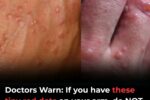Study: Anal Cancer Rates Rising Among Older Women

A recent study has raised an alarming concern: anal cancer rates are increasing among older women. Once considered rare, this form of cancer is becoming more prevalent in women over the age of 65. Medical experts warn that this upward trend in diagnoses could be linked to several factors that are only now coming to light.
Why the Increase in Anal Cancer Rates?
Anal cancer is a type of cancer that begins in the anus or anal canal, the area where the large intestine meets the rectum. While it has traditionally been rare, especially in older adults, recent data suggests a significant increase in cases, particularly among women over 65. One reason for this rise is thought to be the link to the human papillomavirus (HPV), a sexually transmitted infection that is a major cause of many cancers, including anal cancer.
HPV infections can remain dormant for years, and older women may have been exposed to the virus earlier in life without knowing it. As they age, their immune systems weaken, making it harder to fight off infections, including HPV, which could potentially lead to cancer.
Other Contributing Factors
Aside from HPV, other lifestyle factors can contribute to the development of anal cancer. These include:
- Weak immune systems: People with compromised immune systems, such as those with HIV, are at a higher risk.
- Chronic inflammation: Conditions that cause long-term irritation, such as inflammatory bowel disease, can increase the likelihood of developing anal cancer.
- Diet and lifestyle: A diet low in fiber and high in processed foods, along with excessive alcohol consumption, can be risk factors.
- Delayed diagnosis: Symptoms of anal cancer can be mistaken for other conditions like hemorrhoids, which may delay detection and treatment.
The Importance of Early Detection
Early detection is crucial in successfully treating anal cancer. Symptoms may include:
- Bleeding from the anus or rectum
- Pain or discomfort around the anus
- Itching or a feeling of fullness in the rectum
- A lump near the anus
Unfortunately, many women do not seek medical help until the cancer has progressed, leading to lower survival rates. Regular screenings, especially for women over 50 or those with known risk factors, can help detect abnormalities early on.
Prevention and Protection
While the rise in anal cancer rates is concerning, there are steps women can take to lower their risk:
- Get vaccinated against HPV: The HPV vaccine, which is recommended for both men and women, can prevent the strains of the virus that lead to anal cancer.
- Practice safe sex: Using condoms can help reduce the risk of contracting HPV.
- Regular screenings: Those at higher risk should discuss screening options with their doctor, particularly if they have a history of HPV or other risk factors.
What You Can Do
The increasing rates of anal cancer among older women emphasize the importance of awareness and proactive health management. If you’re over 50, it’s vital to have conversations with your healthcare provider about your risk and the best prevention and screening strategies for you. Early detection and lifestyle adjustments can greatly improve outcomes and quality of life.
FAQs
Is anal cancer preventable?
While there’s no guaranteed way to prevent anal cancer, taking steps such as getting vaccinated for HPV, maintaining a healthy diet, and undergoing regular screenings can significantly lower the risk.
How often should I get screened for anal cancer?
For those at higher risk, such as individuals with HPV or a compromised immune system, regular screening every few years may be advised. Consult your doctor to determine the best screening schedule for you.
What is the survival rate for anal cancer?
When caught early, anal cancer has a relatively high survival rate. However, late-stage diagnoses have a lower survival rate. This underscores the importance of early detection and timely treatment.






